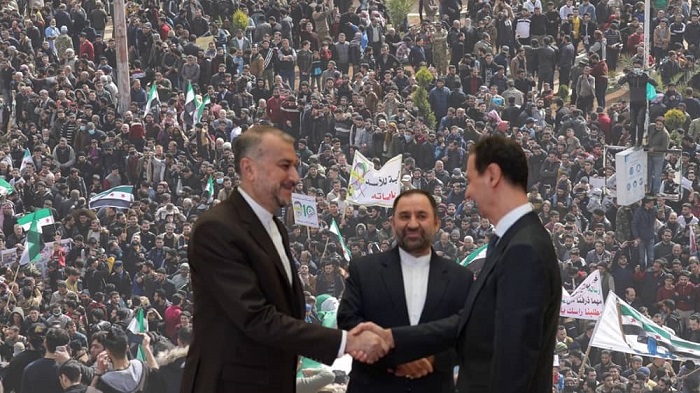
Damascus recently hosted the Iranian Foreign Minister, Hossein Amir-Abdollahian, stirring up discussions surrounding its implications, especially given the renewed uprisings against the Syrian leader, Bashar al-Assad.
The state-controlled Fars news agency relayed that the visit was a bid to bolster regional ties and hasten agreements between Syria and Iran. Furthermore, Iran’s Ministry of Foreign Affairs vouched for their commitment to the stability and territorial integrity of Syria.
Despite the official stance, it’s pertinent to remember the intricate tapestry of Iran’s foreign policy, which has been marked by deception, propaganda, and coercion. This visit marked Amir-Abdollahian’s seventh trip since his appointment. Notably, his X (previously Twitter) post underscored the aim to establish peace and maintain Syria’s territorial integrity, pointing subtly towards the motive of endorsing Assad’s reign and silencing Syrian dissent.
Historically, Syria saw a significant uprising against the regime in March 2011, which faced a brutal crackdown. Iran’s Revolutionary Guard Corps (IRGC) Quds Force, being an ally of the Assad administration, was actively involved in curbing the dissent. The recent surge in protests seems to have provoked Tehran to join hands with Damascus once again in silencing these voices.
در چارچوب تقویت سیاست منطقهی همسایگی و به منظور تسریع در اجرای توافقات روسای جمهور دو کشور عازم دمشق هستم.
در خصوص آخرین تحولات منطقهای و بین المللی با مقامات عالی سوریه گفتگو و رایزنی خواهم داشت.
ایران بر ضرورت برقراری ثبات و آرامش و حفظ حاکمیت و تمامیت ارضی 🇸🇾تاکید دارد.— H.Amirabdollahian امیرعبداللهیان (@Amirabdolahian) August 30, 2023
Iran’s ties with Syria aren’t limited to political allegiance. Last year, when an earthquake rocked Turkey and Syria, the IRGC Quds Force reportedly smuggled arms into Syria, pretending it was humanitarian aid. Furthermore, leaked documents from “Ghiyam ta Sarnegouni” highlighted Iran’s staggering financial commitments to Syria, amounting to $30-$50 billion, despite the economic suffering of Iranians.
The essential question arises: Why is Syria so crucial for Iran? The answer lies in Iran’s geopolitical interests. As Mehdi Ta’eb, head of the Strategic Council of Ammar Headquarters, mentioned, the significance of Syria for Iran surpasses even its own provinces. This was further corroborated by the IRGC, as its news outlet pulled down the revealing statements of slain commander Hossein Hamedani, which acknowledged the extensive Iranian military presence in Syria.
Added to these are revelations from ex-MP Mahmoud Nabavian about the training of Syrian forces and Javad Karimi Ghoddousi, member of the National Security Commission, confirming Iranian forces’ clandestine involvement in Syria.
#Iranian Regime Continues to Recruit Child Soldiers to Fight on Its Behalf
The Basij militia is said to be recruiting child soldiers from Afghanistan to fight on Iran’s behalf in #Syria.https://t.co/zslkAbrjSX pic.twitter.com/PMMQfBHDxx— NCRI-FAC (@iran_policy) October 25, 2018
On the economic front, Syria serves as a lucrative hotspot for smuggling networks tied to the IRGC, acting as a pivotal route for drug trafficking. The phosphate mines, vital for Iran’s nuclear plans, further augment the significance of Syria for Tehran.
Given the mounting internal discontent, Iran’s present foray seems targeted at suppressing Syrian protests against Assad. As 2023 progresses, the fates of Syria and Iran rest in the hands of their resilient populations and the global community’s response.

MEK Iran (follow us on Twitter and Facebook), Maryam Rajavi’s on her site, Twitter & Facebook, NCRI (Twitter & Facebook), and People’s Mojahedin Organization of Iran – MEK IRAN – YouTu
